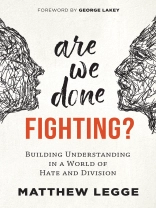Powerful tools for spreading peace in your community
Unfounded beliefs and hateful political and social divisions that can cascade into violence are threatening to pull the world apart. Responding to fear and aggression strategically and with compassion is vital if we are to push back against the politics of hate and live in greater safety and harmony.
But how to do it?
Are We Done Fighting? is brimming with the latest research, practical activities, and inspirational stories of success for cultivating inner change and spreading peace at the community level and beyond. Coverage includes:
- An explanation of the different styles of conflict
- Cognitive biases that help explain polarized and lose-lose positions
- Practical methods and activities for changing our own and others’ minds
- When punishment works and doesn’t, and how to encourage discipline in children without using violence
- The skill of self-compassion and ways to reduce prejudice in ourselves and others
- Incredible programs that are rebuilding trust between people after genocide.
Packed with inspiration and cutting-edge findings from fields including neuroscience, social psychology, and behavioural economics, Are We Done Fighting? is an essential toolkit for activists, community and peace groups, and students and instructors working to build dialogue, understanding, and peace as the antidote to the politics of hate and division.
AWARDS
- SILVER | 2019 Nautilus Book Awards: Social Change & Social Justice
Inhoudsopgave
Foreword by George Lakey
About Quakers and the Author
Introduction
Using This Book
Activity: Learning Contract or Journaling
Activity: Your Values and a Special Person
Activity: Your Strengths
Section 1: Peace and Power
1. What Peace is Not
Tips from This Chapter
Activity: Group Ideas — What Peace is Not
Example: Experience Changes Beliefs in Kenya
2. Us and Others
Tips from This Chapter
Activity: Transforming Bias
3. Power-over
Tips from This Chapter
4. Power-with and Power-from- within
Tips from This Chapter
Activity: Walk Around
Activity: Find Your Power-from- within
5. Process and Change
Tips from This Chapter
Activity: Meeting an Unsympathetic Politician
Section 2: Communication Skills
6. Firm Belief
Tips from This Chapter
Activity: Decision Making
Activity: Our Position
7. Treating Emotions with Care
Tips from This Chapter
Activity: Making Connections
8. Communication
Tips from This Chapter
Activity: Rewording a Conflict
Activity: Concentric Circles
Questions for This First Concentric Circles Activity
9. Conflict
Tips from This Chapter
Activity: What Would You Need?
Example: Who Gets Recognized?
Section 3: Violence and Interpersonal Peace
10. Seeing Violence
Tips from This Chapter
11. What’s Natural?
Tips from This Chapter
12. Safety
Tips from This Chapter
Activity: Accepting Everyone
Example: The Nashville Sit-ins
13. When Hate Rises
Tips from This Chapter
Activity: Violence
Example: Sammy Rangel
14. Violence in Social Change
Tips from This Chapter
Example: Elections in Idlib City
Activity: Four Elements
Activity: Follow the Leader
15. Who Benefits?
Tips from This Chapter
Activity: Mainstream and Margins
16. Oppressors and Victims
Tips from This Chapter
Example: Pronouns
Activity: What’s Changed So Far?
Section 4: Inner Peace
17. Connection
Tips from This Chapter
18. Changing Ourselves
Tips from This Chapter
Activity: Kindness Meditation
Activity: Gratitude
Section 5: Structural Peace
19. Who’s Dreaming?
Tips from This Chapter
20. Just War, Just Peace, and Responsibility
Tips from This Chapter
Example: Healing and Rebuilding our Communities
21. Unarmed Civilian Protection
Tips from This Chapter
Example: Bear Clan Patrol
Activity: De-escalation on the Subway
22. Mediation
Tips from This Chapter
Example: Concerned Citizens for Peace
23. Peace Education
Tips from This Chapter
Example: Power-with the Smallest Children?
Activity: Peacebuilding Dreams
Activity: What is Peace?
24. What Peace Is
Tips from This Chapter
Appendix 1: What We Mean by a Culture of Peacebuilding
Appendix 2: The Basics of Facilitation
Notes
Index
About New Society Publishers
Over de auteur
Matthew Legge is the Peace Program Coordinator of the Canadian Friends Service Committee (Quakers). He has supported locally led peace building initiatives in 30 countries as a volunteer, consultant, board member, and fulltime staff member. Matthew lives in Toronto, Canada.












